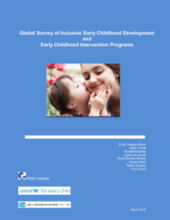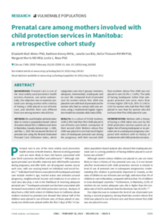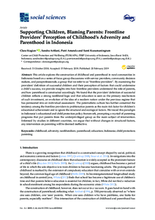Displaying 281 - 290 of 950
Drawing on in-depth interviews with fifteen community workers, who represent nine agencies assisting families with child protection issues in a small jurisdiction in Australia, the authors of this article show how the stigma attached to ‘bad’ parents is passed on to the community workers who are supporting them.
Sreyny Sorn, manager of the ABLE Project at Children in Families, gave a presentation at a side event at the United Nations Human Rights Council in Geneva on 5 March, 2019.
This study examined the effectiveness of solution-focused brief therapy (SFBT) on child well-being and family functioning outcomes for child welfare involved parents.
This report presents the findings of a global survey designed to map current implementation of Inclusive Early Childhood Development (IECD) and Early Childhood Intervention (ECI) programs, among other objectives, and outlines recommendations based on those findings.
This study utilized administrative data that reviewed child welfare cases in a Midwestern state in the U.S. to examine interactions between teamwork and parent engagement associated with the permanency of children in out-of-home care.
The objective of this study was to examine prenatal care among women with a history of having a child placed in out-of-home care, and whether their care differed from care among women who did not.
The aim of this study is to explore whether girls who are in residential care have fewer emotional skills than their peers, and if so, whether these girls have similar socio-emotional skills to girls who also experience disadvantaged environments but live with their families.
This open access article explores the construction of childhood and parenthood in rural communities in Indonesia based on a series of focus group discussions with service providers, community decision makers, and paraprofessionals; a group that the authors refer to as “frontline providers”.
This article examines the professional identities of family therapists employed by Family Counselling Services (FCS) in Norway and their experiences providing therapeutic services to parents whose children are placed in public care.
In this video, State Representative Rena Moran and State Senator Jeff Hayden of the U.S. state of Minnesota introduce legislation that would establish guidelines to prevent the removal of African American children from their families.



